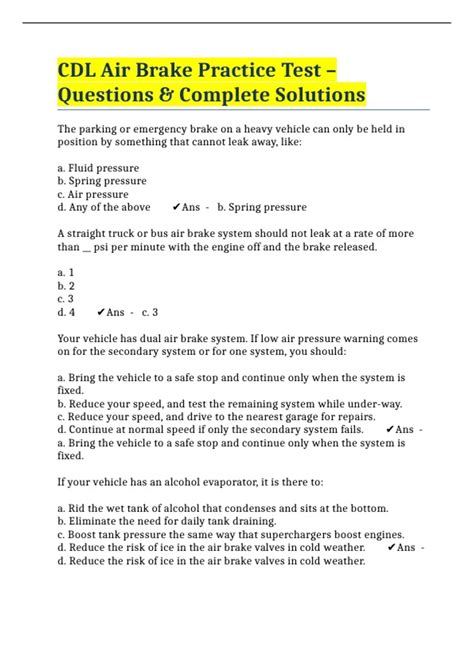Are you ready to conquer the air brake written exam? Our comprehensive practice test will guide you through the essential concepts and help you identify areas that need improvement. Delve into the intricacies of air brake systems, sharpen your knowledge, and increase your chances of passing with flying colors.

Key Concepts for Air Brake Systems
- General Characteristics: Comprehend the composition, operation, and types of air brake systems found in commercial vehicles.
- Components and Functions: Familiarize yourself with the different components, their roles, and how they collaborate to ensure safe braking.
- Air Compressor: Understand the principles of air compressor operation, its maintenance, and troubleshooting techniques.
- Air Reservoirs: Learn about the types, capacities, and functions of air reservoirs, as well as their importance in maintaining adequate air supply.
- Air Lines and Fittings: Explore the composition and installation methods of air lines and fittings, ensuring proper air flow and preventing leaks.
- Brake Valves: Examine the different types of brake valves, their functions, and their role in controlling air pressure within the system.
- Foundation Brakes: Dive into the operation of foundation brakes, including drum brakes, disc brakes, and parking brakes.
- Troubleshooting Common Faults: Develop a systematic approach to troubleshooting and resolving common air brake faults, ensuring quick and effective repairs.
Practice Test Questions
-
Which type of air brake system is commonly used in heavy-duty trucks?
(a) Single-line system
(b) Dual-line system
(c) Triple-line system
(d) Quadruple-line system -
What is the purpose of the air compressor governor?
(a) To regulate air pressure in the system
(b) To lubricate moving parts within the compressor
(c) To filter contaminants from the air supply
(d) To actuate the brake valves -
In a dual-line air brake system, what happens if one of the air lines fails?
(a) The brakes on that wheel will fail
(b) The brakes on the entire vehicle will fail
(c) The brakes on the opposite wheel will apply
(d) The parking brake will engage -
Which component stores compressed air for use in the braking system?
(a) Air reservoir
(b) Air compressor
(c) Brake valve
(d) Foundation brake -
What is the purpose of a check valve in an air brake system?
(a) To prevent air from flowing in the wrong direction
(b) To reduce pressure in the system
(c) To actuate the foundation brakes
(d) To filter contaminants from the air supply -
Which type of foundation brake is commonly used in heavy-duty trucks?
(a) Drum brake
(b) Disc brake
(c) Caliper brake
(d) Band brake -
What is the primary cause of air brake fade?
(a) Excessive heat buildup
(b) Contamination in the brake fluid
(c) Worn brake pads
(d) Insufficient air pressure -
What should you do if the air pressure in the system drops below a safe operating level?
(a) Apply the brakes gradually
(b) Pump the brake pedal rapidly
(c) Shift to a lower gear and use the engine brake
(d) Engage the parking brake
Common Mistakes to Avoid
- Neglecting to check air pressure gauges before driving
- Ignoring minor air leaks, which can lead to major problems
- Using the wrong type of brake fluid, which can damage components
- Failing to adjust brake shoes or pads as needed
- Over-tightening brake lines, which can restrict air flow
FAQs
-
How often should I have my air brake system inspected?
At least annually or as recommended by the manufacturer. -
What are the warning signs of air brake problems?
Leaking air, low air pressure, spongy brake pedal, pulling to one side, and brake fade. -
Can I drive with low air pressure in the brake system?
No, it is extremely dangerous and should be avoided. -
How can I troubleshoot air brake problems?
Follow a systematic process of checking air pressure, inspecting components, and performing diagnostic tests. -
What are some tips for maintaining air brake systems?
Check air pressure gauges regularly, inspect for leaks, adjust brakes as needed, lubricate moving parts, and replace worn components. -
What are the penalties for driving with a defective air brake system?
Fines, loss of license, or even jail time in some cases.
Conclusion
Embark on your air brake journey with confidence. Our comprehensive practice test provides a valuable opportunity to test your understanding, identify areas for improvement, and prepare for the actual exam. Stay vigilant about air brake maintenance, avoid common mistakes, and always prioritize safety on the road. With dedication and perseverance, you can master the intricacies of air brake systems and become a skilled and proficient driver.
